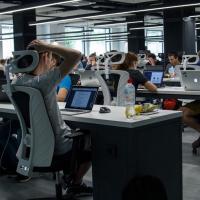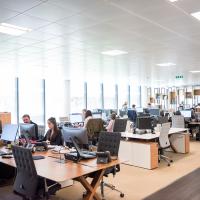The University initiated the Work After Lockdown project to observe how employers and employees adapted their work habits during this unique time.
Funded by the Economic and Social Research Council, the project was a rapid response to COVID-19 by UK Research and Innovation. We partnered with Institute for Employment Studies and Half the Sky to understand the effects of these changing working practices.
Our research showed a permanent mindset shift in how work was organised among the UK’s former office-based workforce.
People missed the sociability and collaboration of offices, but they no longer wanted to commute daily. Workers and their managers did not think this was an efficient way of working.
They wanted to keep some gains of lockdown working, like improved workforce trust and better-quality meetings. Employees aspired to be effective and achieve a healthy work-life balance.
Finding the right balance was central to successful hybrid working. Employers wanted to manage outputs, while employees wanted to choose when and how they work.
Managers have become attuned to listening to staff needs and how they can support these to maximise productivity. Workers desire effectiveness and a balanced work-life.
Our research shows that what began as an accidental experiment around working from home has become a mass hybridisation of the workforce.
Long-term implications of working from home
Employers gathered valuable knowledge about workforce differences during lockdown working. Parents of young children and workers with health limitations or disabilities could work more efficiently with flexible time and space.
Providing evidence of the link between well-being and productivity has been a positive outcome of pandemic working. It offers new tools for leaders and managers so they can become skilled curators of post-pandemic hybrid working.
We presented our findings to employers and policy makers via 3 webinars throughout the project.
Our research was cited in key parliamentary publications on remote and hybrid working. This contributed to the national debate, including for the House of Commons Library and the Parliamentary Office of Science and Technology.
We gave evidence to five parliamentary inquiries and to the European Parliament on the future of women’s work post-COVID. This contributed to the Government’s scoping of its Future of Work review.
The Welsh parliament, the Senedd, heard oral evidence from our project, to inform their Smarter working: a remote working strategy for Wales policy. This aims to have 30% of the Welsh workforce working remotely, thus reducing the daily commute. This will also lower greenhouse gas emissions and enhance the wellbeing of Wales’ economy and workforce.
The research findings have also featured on the BBC, Radio 4, and in broadsheet newspapers such as The Guardian.
We continue to research evolving aspects of new ways of working. This includes:
- how flexible working is incorporated into hybrid working policy and practice
- how people are using working spaces differently post-pandemic
- the implications of hybrid working for diversity and inclusion
Organisations are understandably still feeling their way around this new world of work, but if they apply the lessons of lockdown and tap into the goodwill and adaptability that workers have shown during the pandemic, there can be multiple wins: decent work for everyone that preserves gains around autonomy, flexibility, and work-life balance, as well as enhancing those around productivity and workforce collaboration.
Dr Jane Parry










